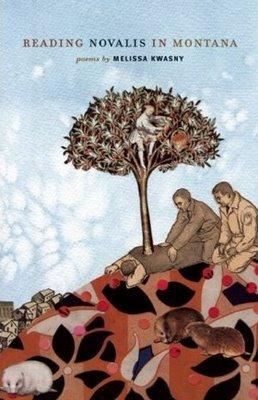Reading Novalis in Montana

Reading Novalis in Montana is a collection of poems by Melissa Kwasny that focuses on connections between the natural world, spirituality, and modern life. The title of the collection rightfully implicates nature and Novalis as the inspiration behind the poems. Novalis, a late eighteenth century poet and writer of Early German Romanticism, focused much his work on the belief in harmony between humans and nature, or the inner and outer worlds.
Spirituality in nature is a strong theme throughout the book. Kwasny’s respect for the outside world is obvious; the poet treats each living thing as an individual existing within its own world. In "Mule Deer," she views the deer, birds, and fish as cartographers drawing lines to suit their own needs. It is a truly refreshing view. Instead of simply coexisting, the poet reflects on what it feels like to live with these different worlds and learn from them.
It is this deep connection to the natural world that leads the poet to introspective questioning of life’s purpose. In the opening title poem, "Reading Novalis in Montana," Kwasny writes: "If, as the gnostics say, the world was a mistake/ created by an evil demiurge, and am I trapped/ in my body, abandoned by a god whom I long for as one of my own,/ why not follow the tundra geese into their storm?"
In the next poem, "Redpolls," she wonders, "What is it that I was supposed to learn?" In "Lepidoptera," she decides that "one reads the world the best one can," but still questions the purpose of her surroundings. She quotes Novalis in the opening poem, writing that "all we experience is a message." While this sounds like a comforting guideline to live by, Kwasny demonstrates it can also be maddening, only leading one to more questions without answers.
There are very few people who claim to have the world figured out. Trying to do so is the lost art Kwasny internally struggles with in her poetry. In "Is It Oblivion or Absorption When Things Pass from Our Minds?" Kwasny talks about "the throwaway life" many humans beings lead.
Trying to find answers to questions of our purpose in the world is exhausting. Most just give up and lead the lives they think they have been given. Thankfully Reading Novalis in Montana never stops asking questions or trying to find answers, reminding the reader there is more to life than one settles for or often cares to know.
We are what we eat.
We get a portion of the sales through Amazon. When Milkweed can offer us that type of arrangement to help us to pay for our own overhead expenses and sustain this blog, we'll happily switch to them. Until then, we've got to pay for things like web hosting and shipping costs, otherwise, FR won't be able to exist.
Thank you for the reflective review. I think you're partly right, about the urge in Novalis and Kwasny to experience a harmony with nature, to let go the nature-humanity dichotomy that's in our Western blood after 5K years of male control. On the other hand, I suspect that one or both of these writers might be suggesting that the attempt to "figure it out" is doomed to the failure and despair of our Cartesian mindset. Better to let the world just come to you, pass through your palm like the chickadees in "Redpolls."
Anyway this book of poems is a stunningly intimate new mind-reader companion who makes me weep every time she speaks.
I would request that you link the title to Milkweed Editions, the donations-based publishers of the title, rather than Amazon. Milkweed seems much more attuned to Feminist Review's aspirations.